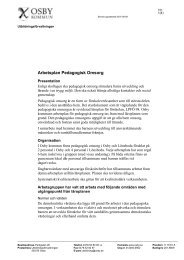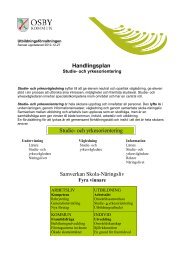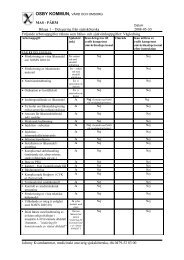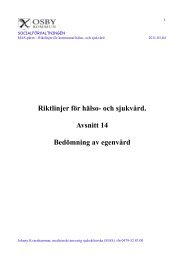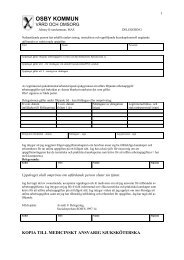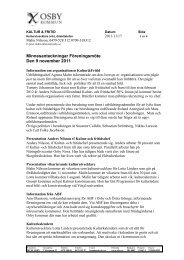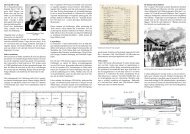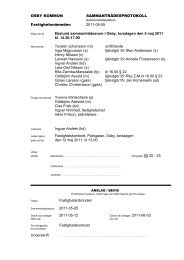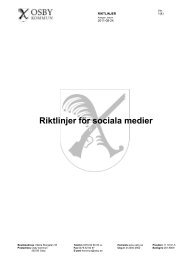Spinning Twinning
Spinning Twinning
Spinning Twinning
You also want an ePaper? Increase the reach of your titles
YUMPU automatically turns print PDFs into web optimized ePapers that Google loves.
<strong>Spinning</strong><br />
<strong>Twinning</strong><br />
– How to Take<br />
your Twin City<br />
Relations to the<br />
Next Level
What kind of brochure is this?<br />
This brochure has been produced as an inspirational tool for people<br />
working in municipal organizations dealing with twin city cooperation.<br />
It consists of ideas, thoughts and experiences gained during the project<br />
<strong>Spinning</strong> <strong>Twinning</strong>, as well as some specific advice on the future of twin<br />
city cooperation. All content is to be considered as consisting of general<br />
remarks and as valid for twin city work even outside the Baltic Sea<br />
Region.<br />
Background<br />
In Sweden today the interest in maintaining twin city relationships is<br />
on the decrease. In other countries around the Baltic Sea the situation<br />
is sometimes the opposite, with many cities wishing to establish new<br />
relationships.<br />
2<br />
“There is very much to learn from each other and twin city cooperation<br />
brings us closer and strengthens our bonds, so we will be able in future<br />
to plan meetings and carry out exchanges. So I think that twinning is as<br />
good as we can make it, the more we are willing to offer, the more we get<br />
out of it.” Raivis Luks, Dobele<br />
Many established relationships between cities have also reached a level<br />
where only very few meetings actually take place. Many Swedish municipalities<br />
are discussing whether to end their twinning agreements,<br />
though few do so, since this would entail their breaking up longstanding<br />
personal relations with those in the twin city.<br />
“Such relationships can be very important. It is up to the partners to keep<br />
them important and to fill them with content. Otherwise, it is better to<br />
end them. Not all relationships work equally well. It is perhaps better<br />
to consider which ones are worth putting energy into”. Tomas Petersson,<br />
Staffanstorp<br />
To cope with this situation the idea behind <strong>Spinning</strong> <strong>Twinning</strong> was to<br />
work towards a more strategic and project oriented relationship, using
the relationships as a basis for modern development cooperation around<br />
issues important to both sides.<br />
“In my opinion Twin City cooperation has taken on another meaning<br />
today, compared to when we entered into the agreement 20 years ago. Today<br />
we still consider it as a way of support and contribution. It has been<br />
meaningful for the receiver for many years, but today our twin cities can<br />
manage by themselves.<br />
Today they want to meet us on an equal level based upon the same conditions.<br />
A mutual development of experiences is needed for them. We have<br />
the same type of problems.” Jan Lundmark, Simrishamn<br />
What was <strong>Spinning</strong> <strong>Twinning</strong>?<br />
<strong>Spinning</strong> <strong>Twinning</strong> was a 18 month long development project led by<br />
the Association of Local Authorities in Skåne – Kommunförbundet<br />
Skåne – which is an interest-based organisation for all 33 municipalities<br />
in the region of Skåne in southern Sweden.<br />
The project, which was co-financed by Swedish institute, lasted from<br />
spring 2011 to summer 2012.<br />
We wanted to carry out a “project development project” together with 7<br />
of the 33 municipalities in the region of Skåne and their respective twin<br />
cities in Latvia, Lithuania and Poland.<br />
Which were the objectives of <strong>Spinning</strong> <strong>Twinning</strong>?<br />
The overall aim of <strong>Spinning</strong> <strong>Twinning</strong> was to vitalize the twin city agreements<br />
of the participating municipalities.<br />
Furthermore, the objective was to contribute to the rising of the number<br />
of fruitful projects in the Baltic Sea Region. These should be projects<br />
targeting mutual development needs. The goal was to work with<br />
a number of new project ideas which, after the project ended, would<br />
result in at least five completed applications, to EU-programs or other<br />
national or international funders.<br />
3
The third objective was to raise general awareness concerning the role of<br />
the Baltic Sea Region.<br />
Finally, the experiences and lessons learned from the project were to be<br />
disseminated, mainly through this brochure.<br />
Who participated in <strong>Spinning</strong> <strong>Twinning</strong>?<br />
From Swedish side the following municipalities participated together<br />
with their twin cities in Latvia, Lithuania and Poland.<br />
4<br />
• Hörby and Pyrzyce in Poland<br />
• Kristianstad and Siauliai in Lithuania<br />
• Lund and Zabrze in Poland<br />
• Osby and Kretinga in Lithuania<br />
• Simrishamn and Palanga in Lithuania<br />
• Staffanstorp and Wolin in Poland<br />
• Ängelholm and Dobele in Latvia
Why <strong>Spinning</strong> <strong>Twinning</strong>?<br />
The participating municipalities have felt the need to vitalize relations<br />
and in many places there has, at the same time, not been any initiating<br />
force for carrying this out.<br />
The idea was to use already established contacts to increase the number<br />
of development projects based on mutual areas of interest in the Baltic<br />
Sea Region. Thus, <strong>Spinning</strong> <strong>Twinning</strong> can be seen as a part of the EU<br />
strategy for the Baltic Sea Region.<br />
What happened during <strong>Spinning</strong> <strong>Twinning</strong> April 2011 –<br />
August 2012?<br />
The participating municipalities were guided through the whole process,<br />
from the discussion of the current status of the partnership relations,<br />
through analyses of needs, to generating of projects and the spreading<br />
of knowledge about suitable EU-programs which are appropriate as<br />
potential funders.<br />
The project management continuously pushed the process forward and<br />
with the help of e-mail contacts and other measures of support, ensured<br />
a smooth, uninterrupted flow between the physical meetings, that the<br />
project arranged and financed.<br />
<strong>Spinning</strong> <strong>Twinning</strong> carried out three major activities:<br />
A three day meeting in Simrishamn in Skåne in June 2011, which laid<br />
the foundations for the whole project. During the meeting discussions<br />
were held and lectures were given on the project’s themes: the changed<br />
conditions for twin city cooperation; the role of the Baltic Sea strategy<br />
as connected to our mutual history and identity; and methods of project<br />
development. A workshop was also held to generate and spark practical<br />
ideas.<br />
Between June and December 2011 the participating municipalities<br />
continued to develop their project ideas with support from the project<br />
management.<br />
5
A four day meeting in Vilnius in November 2011 functioned as a qualified<br />
“writing workshop”. Applications were written, suitable EU – or<br />
other funds were identified and time frames for the continued work<br />
between the participating municipalities were decided and documented.<br />
Results<br />
In May 2012 six applications to EU-funds had been approved.<br />
Conclusions<br />
All participating municipalities were convinced of the benefits of using<br />
authentic development needs and receiving support the whole way<br />
through a project´s life cycle: from vision to submitted application.<br />
“There is too much idle talk and not enough happening. The traditional<br />
relations at just the political level are not enough. We must think more<br />
strategically and use the opportunities the relationships can give us to<br />
strengthen our mutual development.” Kristina Prahl, Kristianstad<br />
In the following we have summarized the statements from the participants<br />
in order to provide some advice on how to vitalize twin city<br />
relationships.<br />
What is important to consider when developing the twin<br />
city relationships into modern municipal development<br />
work?<br />
One identified success factor in developing the twin city relationships is<br />
connected to the organization structure of the municipality.<br />
6<br />
“It is good to have an internal network, consisting of civil servants working<br />
with international issues, within the municipality.” Kristina Prahl,<br />
Kristianstad<br />
To have a centrally placed committee deciding about international work<br />
is another good idea. In this committee, politicians from both the ruling
majority and the opposition should meet regularly, together with the<br />
leading civil servants. This is a way to secure the chain of command<br />
which is needed, if the idea of working with important issues together<br />
with a twin city, is to reach all levels in municipal departments.<br />
“Consider twin city relations as a part of all other municipal work. Treat<br />
it the same way. It cannot live by itself. It should be considered as all<br />
other municipal work based upon the goals of the municipality.” Kristina<br />
Prahl, Kristianstad<br />
“We have a relatively informal way but it works. There is a consensus between<br />
majority and opposition in these issues and that makes sure that it<br />
will not turn into party politics. I keep both sides informed all the time.”<br />
Tomas Petersson, Staffanstorp<br />
It is also important to organize the physical meetings between the twin<br />
cities not only as formal meetings but also to allow for specialists to sit<br />
down and discuss the important issues they face in their everyday work.<br />
“One easy way of vitalizing them could be to adjust the programs when<br />
we meet. Instead of just formal talks we could divide specialists within<br />
different fields into groups, just letting them tell each other what is hap-<br />
7
8<br />
pening in their respective municipality connected to the mutual areas of<br />
interest. All partners would then learn a lot.” Yvonne Kvist, Osby<br />
“Make sure that programs have space for spontaneous activities. In relaxed<br />
situations people dare to ask questions they would never ask in more<br />
formal contexts. Make the programs more relaxed.” Irene Nyqvist, Hörby<br />
“It is important to really think in depth beforehand, about the program<br />
for the twin city activities, so we can invite the relevant people in order<br />
to identify which areas to be discussed. We must really question what the<br />
purpose is of every meeting.” Wiveca Britzén, Ängelholm<br />
One important factor is to have relevant documents describing the strategy<br />
of the municipality on international issues.<br />
“Make sure that the relationship is at an adequate level. Do not produce<br />
any broad strategic documents that cannot be realized. Be politically<br />
realistic. Strategic documents must be realistic. We have a policy on international<br />
cooperation which<br />
is at a realistic, achievable<br />
level.” Yvonne Kvist, Osby<br />
The importance of having<br />
good relationships at personal<br />
level was stressed several<br />
times during the discussions:<br />
“You must develop some<br />
kind of friendship to start<br />
upon. If there are no areas of<br />
socialising it is hard to cope<br />
with development issues. The<br />
importance of the personal<br />
relationship must be highlighted.”<br />
Tomas<br />
Petersson, Staffanstorp
Advice<br />
• Develop a structure in your own organisation where a<br />
committee consisting of politicians from all parties and<br />
leading civil servants are responsible for the international work<br />
• Create an internal network to support the implementation of the<br />
international work at department level<br />
• Arrange the meetings so people really discuss important<br />
development issues<br />
• It is a success factor if the mayors are able to communicate<br />
directly without interpreters and develop a close relationship<br />
• Try to save space in all programs for informal talks<br />
• Consider which relations are worth maintaining and focus on<br />
them<br />
• Start discussions around concrete development work<br />
• Provide practical support for developing project applications<br />
• Use EU- funding to finance the development work<br />
What is needed in order to develop twin city relations<br />
towards modern municipal development work?<br />
In most cases lack of money is not the main obstacle. Rather, other<br />
types of resources are needed, for example an open attitude at all municipal<br />
levels towards this work.<br />
“A strong political support is essential. I think that the politicians must<br />
consider their own role. Are they involved in the relation or not? It ought<br />
to be only interested and devoted politicians involved, otherwise it will<br />
not lead to anything. Those engaged must be open and interested. If you<br />
bring politicians, do not choose them because of their position (maybe<br />
with the exception of the mayor) but based on their degree of interest. In<br />
doing so their interest will spread to others.” Irene Nyqvist, Hörby<br />
9
10<br />
“Personal interest among the politicians is also very important. There<br />
must be some leading politicians who carry the responsibility. They do not<br />
necessarily have to belong to the municipal executive committee. Interest<br />
may also occur at other levels, but there have to be leading actors.<br />
Ideas must also come from people working at department levels. The<br />
people that have the ideas must be prepared to fight for them.” George<br />
Heuwing, Lund<br />
It is also important that all municipal organizations wishing to develop<br />
their twin city relation must provide a support function – someone who<br />
can give advice to other colleagues who are willing to put some energy<br />
into this job. The importance of providing time resources must be stressed.<br />
“It is important to have civil servants who are brave enough to try testing<br />
new ideas. It is important that there is support from senior advisors with<br />
experience. The use of lobbying is a must at civil servant level. To have<br />
a supportive function for those with brave ideas, is one factor leading to<br />
success.” Irene Nyqvist, Hörby<br />
“Someone in the organization must continuously make sure that at least<br />
once a month, dialogue takes place by phone or on Facebook. You can<br />
never allow dialogue to reach a standstill because it will then be much<br />
harder to pick up. It is easier to maintain the relationship by a phone call<br />
once a month to just get some updated information about what is going<br />
on.” Tomas Petersson, Staffanstorp<br />
In many municipalities the whole process with twin city relationships<br />
depends on a few devoted individuals: politicians or civil servants.<br />
“To have devoted individuals is a criteria for success. These individuals<br />
must also have supportive leaders – all the way up. A devoted individual<br />
needs co-partners in the workplace – colleagues who can share the workload.”<br />
George Heuwing, Lund
However, all this is not enough. To be able to carry out the development<br />
of a twin city relationship, a great deal of anchoring at all levels in the<br />
municipality is needed, from the highest levels, down to the individuals<br />
working at department levels.<br />
It is also important to have some kind of structure providing continuity<br />
for the twin city cooperation.<br />
“The success is related to some mandate given through documented political<br />
decisions. Without this mandate and authority no one dares to take<br />
decisions. This is as important all the way through, at the administrative<br />
levels. To a large extent it is a question of individuals. The ones who will<br />
run the project must create enthusiasm in others in order for the project to<br />
be successful. It must be a person dedicated and able to spread ideas.” Jan<br />
Lundmark, Simrishamn<br />
“The civil servants dealing with this must have legitimacy. To have the<br />
right attitude at top administrative level is important. We have a chain of<br />
command making it possible to transfer the positive attitude further down<br />
in the organization.<br />
11
12<br />
There must be a good, nourishing soil abundant in the organization<br />
proclaiming it is ok to think outside the box, a flexible attitude to new<br />
things. The absolute key factor is that the citizens are involved through<br />
activities.” Irene Nyqvist, Hörby<br />
“The operative levels in the municipality must first agree upon participation.<br />
It cannot begin with a decision from above because that will not<br />
really find its place in the operative organizations.” Wiveca Britzén,<br />
Ängelholm<br />
Advice<br />
• Make sure that there is political support from the very top<br />
• Document this political support<br />
• Make sure that practical ideas of cooperation are anchored at<br />
operative level at the departments and not only at political top<br />
level<br />
• Have a clear chain of command for executing the political<br />
decisions<br />
What are the cultural aspects to consider in twin city<br />
development?<br />
Working with twin city relations continuously confronts us with various<br />
interesting situations, based upon cultural differences. Most people<br />
however find such contrasts positive as they are in fact the core value<br />
behind the idea of the whole project:<br />
“If we did not want to experience them, we could stay at home.” Irene<br />
Nyqvist, Hörby<br />
“The cultural differences among twin cities are inevitable. You should not<br />
fear them , they form the basis of mutual contacts, awakening curiosity<br />
and willingness to meet partners.” Ryszard Banaszkiewicz, Wolin<br />
The best way of coping with the cultural differences seems to be to<br />
adopt the saying: “When in Rome do as the Romans do”. Meaning we
cannot expect our friends to change their habits when we meet them<br />
and we should not change ours when they visit us.<br />
“It is important to discuss with each other and pass on basic information,<br />
in order to be prepared to understand things which we might not grasp<br />
at first glance. Focus on the importance of getting to know each other as<br />
persons.” Tomas Petersson, Staffanstorp<br />
Another way of handling cultural differences is to ask questions. Ask<br />
all questions that are needed so as not to create a barrier. Be honest and<br />
open, so that there is no risk of misunderstandings. Make sure that you<br />
have all the information you need, before entering a meeting just to<br />
be on the safe side and to avoid the risk of misunderstanding or being<br />
misunderstood.<br />
“A lot of the problems we face are due to lack of communication, unwillingness<br />
to say that you do not understand and lack of knowledge. Often<br />
you are not secure in your communication and the use of an interpreter<br />
all the time is not possible. Often you get the feeling that they understand<br />
but they have actually not done so. If this situation is connected to pride,<br />
it will create problems.” Jan Lundmark, Simrishamn<br />
Twin city relationships are similar to old friendships and you could act<br />
as if they were in fact a relationship between old, close friends.<br />
“Dealing with cultural differences is all about trust and respect. You<br />
must meet the individuals in order to reach trust. After this trust has<br />
been reached, you can discuss organizational issues etc.” Jan Lundmark,<br />
Simrishamn<br />
“We must learn to bring up issues that are slightly negative. If you have<br />
a secure relationship it must also be able to handle elements that are not<br />
only positive.” Yvonne Kvist, Osby<br />
Advice<br />
• The cultural differences are the main outcome in themselves<br />
13
14<br />
• It is up to you to ask questions in order to feel comfortable on<br />
all occasions, where cultural differences occur<br />
• Remember that you are dealing with a friend. To a friend you<br />
can say things that are not only positive in order to strengthen<br />
your relationship<br />
Summarized strategic advice for driving your twin city<br />
cooperation towards modern municipal development<br />
work.<br />
• The instructions to the civil servants must be clear: Twin city<br />
cooperation must consist of real development work.<br />
• If there are political changes in one or both of the twin cities the<br />
need for political anchoring is more important. The mayors must<br />
be on track.<br />
• The politicians should be open to suggestions coming from the<br />
civil servants.<br />
• Encourage and support ideas coming from people working at<br />
department levels.<br />
• Appoint a responsible civil servant for twin city relations with<br />
support from the superior levels.<br />
• Have very distinct anchor strategy in both your own and in the<br />
twin city´s organization, in order to succeed with projects.<br />
• Keep regular contacts by phone or via internet.<br />
• Do not try to keep up a twin city relationship if there is no real<br />
substance.<br />
• Involve the citizens through activities.<br />
• People are very important in twin city cooperation. Their<br />
commitment, creativity and wish to broaden their horizons and<br />
gain extensive knowledge about functioning of other nations, are<br />
important.<br />
• Use the EU-program Europe for Citizens to develop your<br />
relationships. The financing can make it possible to arrange
meetings where you can discuss development issues.<br />
• Consider twin city relations as a part of all other municipal work.<br />
Treat it the same way. It cannot live by itself. It should be<br />
considered as all other municipal work based upon the goals of<br />
the municipality.<br />
• Working with different types of people, try to avoid prejudices<br />
concerning other colleagues´ ability to work in this field. Do not<br />
be afraid of bringing other peoples’ ideas in to the table.<br />
Photos: Municipality of Simrishamn, Wiveca Britzén and Raivis Luks<br />
15
Association of Local Authorities in Skåne, 2012<br />
www.kfsk.se<br />
Peter Nilsson<br />
p.nilsson@kfsk.se



